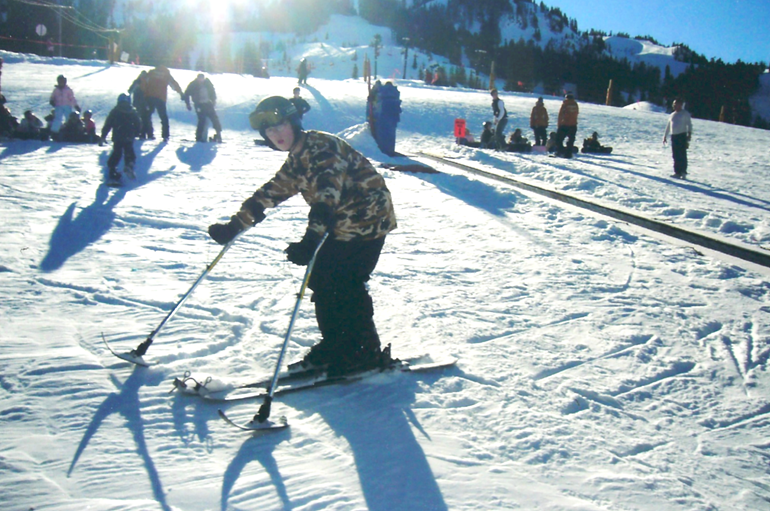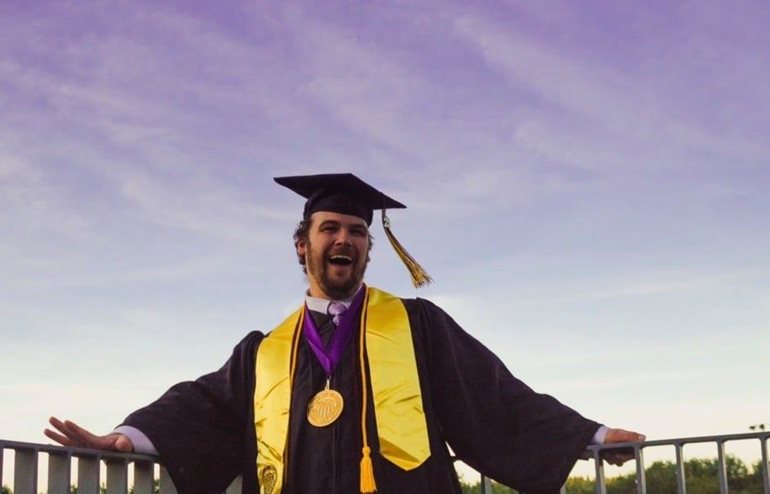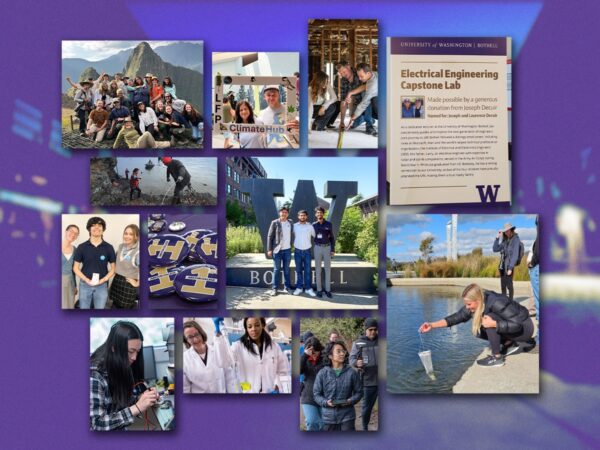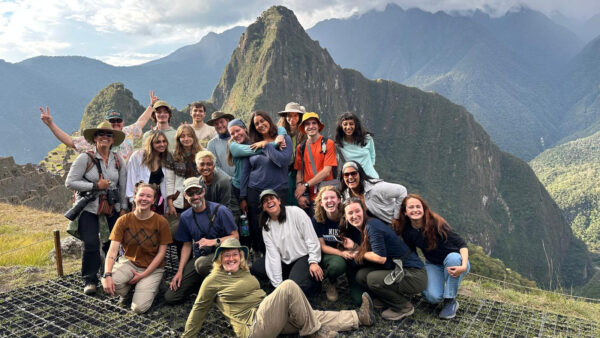It was a cold, overcast afternoon in January 2009, like most during a Washington winter. Christopher Hays, then 16 years old, was at The Summit at Snoqualmie, a place he had been many times before. On this seemingly ordinary day, however, Hays’ life changed forever.

He was on the slopes with Outdoors for All, an organization that helps kids and adults with disabilities participate in outdoor activities. An administrator approached Hays and asked him if he could stand to perform a test. Hays stood. The administrator pushed on Hays’ shoulder to see if he would fall. Hays didn’t. Hays was then asked a question that would shape the rest of his life: Are you interested in learning to ski?
For most people this question might be exciting, sure, but life changing? Probably not.
Hays is a person with cerebral palsy who often struggles to complete everyday tasks. For him, learning to ski was a source of freedom. “It gave me a sense of liberation that I have never let go. I had always had to depend on others to do simple things like get dressed or open a can of soda,” Hays said. “Skiing was the first thing I could do by myself, and it gave me the courage to become more independent. It was the catalyst to breaking free and discovering my voice.”
Now a 2021 graduate from the University of Washington Bothell with a degree in Law, Economics & Public Policy and a minor in Human Rights, Hays uses his voice to educate University leaders and government officials about accessibility issues on campus and in society. In recognition of all he has overcome and his eagerness to support others facing similar challenges, Hays was named one of the 2021 Husky 100.
Paving the way

The UW each year recognizes undergraduate and graduate students from the Bothell, Seattle and Tacoma campuses who are making the most of their time at the University. These Husky 100 recipients actively connect what happens inside and outside of the classroom, applying what they learn to make a difference on campus and in the community. Hays is one of 12 students from UW Bothell to be recognized last academic year. Additionally, he was the recipient of the University of Washington Bothell’s 2021 Chancellor’s Medal.
As an LEPP major, Hays focused his studies on equity and transforming society into a place that works for everybody. “Society wasn’t built for people like me,” he said. “It was built for people to depend on stairs, not ramps.”
Instead of feeling defeated by this, Hays felt motivated. He started sharing his experiences with others on campus and became a member of the Chancellor’s Advisory Committee for Students where he added a voice of accessibility to the group.
“Chris was somebody that the committee could always depend on,” said Lenina Arenas-Fuentes, chief of staff in the Office of the Chancellor. “He didn’t just show up to meetings, he came prepared and ready to give his informed opinion.”
One of the insights Hays brought to the committee was his experience with handicap parking. He said the spaces at UW Bothell are too clustered and that placing many handicap spots in the same area is flawed. “The spaces aren’t proportionate around campus. We need a more strategic plan of where to place them, so that people who are mobility impaired can park closer to where their classrooms are and be free of the burden of needing to walk longer than necessary,” he said.
Hays was an asset to the committee in part because he could provide such unique insight, Arenas-Fuentes said. “As someone without a disability, I can testify that our privilege makes us blind to their needs,” she said. “That is why having Chris’ perspective was so valuable.”
A simplified system
Hays recognizes that not all disabilities are visible and that many people suffer in silence. Anxiety and depression, for example, are mental health disorders that are increasingly common in young adults. As students adjust to college life, they may discover they need some extra help along the way.
That is why Hays, while on the CACS, suggested that campus resources be compiled in one place online so that students can more easily find the information and help they need.
“For me, it was a big struggle to find the resources I needed to be successful because they were built into different departments and webpages,” Hays said. “I had to really be an advocate and seek out those resources myself.”
Ideally, Hays envisions a system where students could type key words about their needs into a search engine and software would identify campus resources to help them. For example, a student whose search included words such as “depression” or “anxiety” would be directed specifically to the counseling center. Similarly, a student struggling with writing could type in “essay help” and be taken straight to the Writing & Communication Center webpage.
Hays is hopeful that future students will one day benefit from these types of webpages and web search engines. “A lot of times, people in need of help are already depleted and having a system like this would alleviate that extra burden of having to navigate a difficult system,” he said.
An advocate for all
Hays’ advocacy extended beyond the UW Bothell campus and may reach schools across Washington state. In September 2020, he worked as a legislative intern in Olympia and helped to draft a bill for his representative, Lisa Callen, that would allow students to claim mental health as an excused absence in school.
“Christopher drafted the bill after researching what other states are doing and what the constituents are looking for,” Callen said. “He then consulted with the House of Representatives Office of Program Research on what the current law is on absences in K-12.”
Importantly, the bill would not just allow mental health to be an excused absence, it would also mandate a school counselor to have a one-to-one session with any student who claims two or more mental health days a quarter. “We want students to feel empowered to take care of themselves,” Hays said, “but we also want to have a mechanism in place to support them if they are struggling.”
If passed, the bill will go into effect in 2023. “Knowing that some of the words I put on paper could be on the Washington code is just so cool,” Hays said. “It gave me a sense of accomplishment in being heard and for raising the voices of other communities, too.”
Callen said Hays is the person who one hopes will go into public policy. “He does the hard work of understanding every side of an issue, who and what will be impacted, and why it matters. When an impact was missed, he spoke up and educated all of us,” she said.
“I know my legislative colleagues and I are better representatives because of what we learned from him.”
Proud to be disabled
For Hays, being named a Husky 100 is validation that the things he fought for in his educational career were the right things.
“I am proud of really embracing my disability and the disabled community because, before UW Bothell, I had a lot of shame, a lot of guilt and a lot of regret about being disabled,” he said.
“UW Bothell has helped me to embrace my own individuality and my community. I don’t possess that shame anymore. I don’t possess that guilt anymore. I am proud to be disabled, and I am happy to show the world that I am disabled and that I can still do amazing things.”


